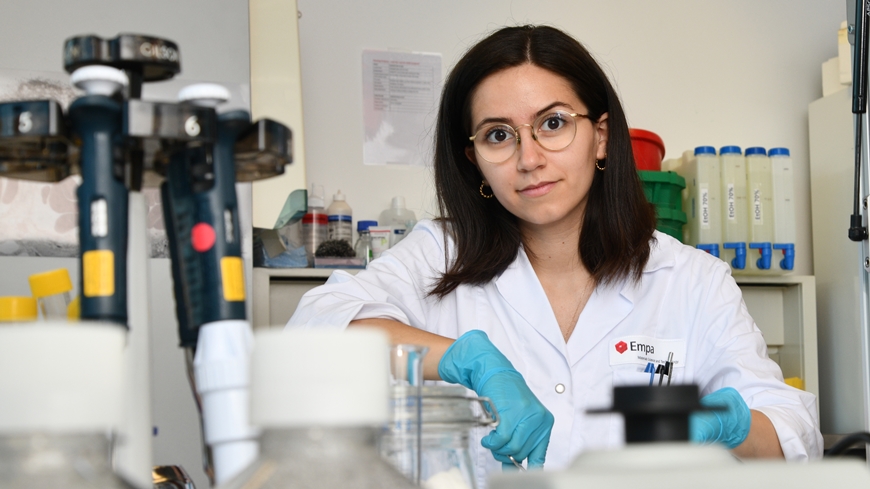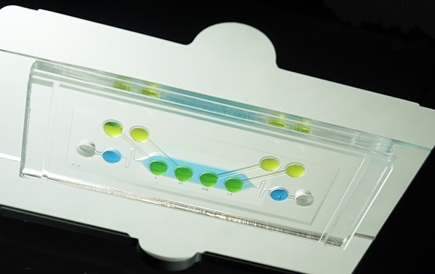Breakthrough in Pregnancy Safety Testing
Young 3Rs Investigator Award honors Empa researcher
The 2024 Young 3Rs Investigator Award has been awarded to Empa researcher Manon Murdeu for her outstanding work in advancing human-relevant alternatives to animal testing. Her innovative research in reproductive toxicology exemplifies the 3Rs principle by reducing animal use while enhancing the quality and ethical standards of biomedical science.

The Swiss 3R Competence Centre (3RCC) proudly announces the winners of the 2024 3Rs Award and the Young 3Rs Investigator Awards, honoring outstanding contributions to the Replacement, Reduction, and Refinement of animal use in scientific research. The jury has awarded the 2024 3Rs Award to Fides Zenk (EPFL) for her pioneering work on epigenetic regulation during early embryonic brain development using human brain organoids. The Young 3Rs Investigator Awards have been granted to Doris Zauchner (ETH Zurich) for developing a personalized, non-animal model of the rare bone disease Osteogenesis Imperfecta, and to Manon Murdeu (Empa) for creating a human-based placenta-embryo chip to assess developmental toxicity during pregnancy.
The primary 3Rs Award, accompanied by a CHF 4,000 prize, honors a major contribution to the 3Rs principle. The two Young Investigator Awards, each worth CHF 2,500 and co-funded by the National Research Programme NRP 79 – Advancing 3R, recognize early-career scientists whose research significantly advances the goals of Replacement, Reduction, or Refinement in the use of animals in science.
The 3RCC congratulates all three awardees and thanks every applicant for their valuable efforts to advance the 3Rs in Switzerland.
Manon Murdeu wins Young 3Rs Investigator Award

Manon Murdeu, a doctoral researcher at Empa’s Particles-Biology Interactions Lab, has received a 3Rs Young Investigator Award for developing a groundbreaking placenta-embryo chip—an innovative, human-based tool to assess the effects of chemicals, drugs, and nanoparticles during pregnancy without using animals. Her work tackles a major gap in health research: the lack of safety data on how substances affect pregnant women and developing embryos.
Currently, over 90% of approved drugs and most environmental chemicals lack reliable data on their safety during pregnancy. Due to ethical and legal restrictions, pregnant women are rarely included in clinical trials. As a result, nearly all testing for developmental toxicity still relies on animal experiments — particularly in rodents — despite significant biological differences between species. Each standard study can involve hundreds of animals, and globally, tens of thousands are used annually for this purpose.
Murdeu’s model offers a compelling alternative. Her chip co-cultures human placenta and embryonic tissue in a simple, pump-free system that mimics the maternal-fetal interface. It allows scientists to study how substances transfer through the placenta and affect early development—providing human-relevant insights that animal models often miss. Importantly, the chip’s user-friendly design makes it accessible to researchers without specialized training in microfluidics. Reviewers praised the project’s scientific rigor and far-reaching potential: “The development affects very high animal numbers around the world.” “It is encouraging to see the model gaining attention from international stakeholders and being positioned for broader regulatory relevance.” “I am particularly impressed by the effort to fill a significant data gap in the evaluation of toxicokinetics and toxicodynamics during pregnancy, an area where data are lacking for the vast majority of approved drugs and environmental chemicals.”
Murdeu states: "Receiving this award is both an honor and a motivation to push the boundaries of women's reproductive health research and, hopefully, it will inspire other young scientists to develop and improve new human-based alternatives to animal models." She adds: "With our model we aim to gain early pre-clinical data for drug and nanoparticle hazard assessment, contributing to the protection of pregnant women and developing fetuses while reducing the need for extensive animal testing." With growing interest from research and regulatory communities, Murdeu’s placenta-embryo chip could become a first-tier tool in international safety assessment frameworks. Her work stands to significantly reduce the use of animals in developmental toxicity testing while improving protections for maternal and fetal health.
About the Swiss 3R Competence Centre’s (3RCC) Annual 3R Awards
Manon Murdeu
Nanomaterials in Health
Phone +41 58 765 7037
Dr. Tina Bürki
Nanomaterials in Health
Phone +41 58 765 7696
-
Share






